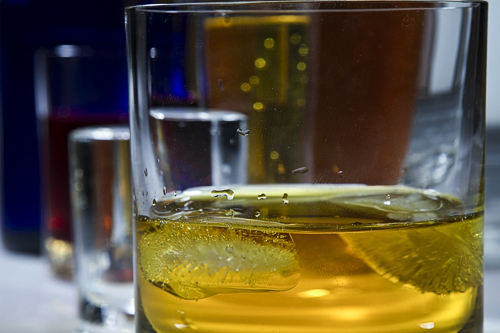If life were like the movies, we’d all find and follow a certain trajectory during our college years. Meet the friends you’ll keep for the rest of your life, have a great dorm/roommate experience, fall in love, fall out of love, fall in love again (and again), marry your college sweetheart and, of course, party the entire time while still getting awesome grades.
A pintful of risks

If life were like the movies, we’d all find and follow a certain trajectory during our college years. Meet the friends you’ll keep for the rest of your life, have a great dorm/roommate experience, fall in love, fall out of love, fall in love again (and again), marry your college sweetheart and, of course, party the entire time while still getting awesome grades.
That last one might be the only feasible one on the list. For many of us, college comes with the belief that we’re indestructible, and as long as we’re able we should party as much as possible. While there is some truth to that—and by some I mean a very, very small fraction of truth—constant partying has a lot of negatives: horrible, horrible hangovers; bombing a huge exam because you didn’t get enough sleep the night before; regrets; not eating well because you’re spending all your money on boozing; did I mention regrets?
We’re warned about this from day one. If we’re not being educated at home, we’re hearing it in school, on TV, in the movies, et cetera. However, new research is surfacing that shows even minimal alcohol consumption can have huge consequences.
The San Francisco Chronicle recently reported that alcohol “has been known to be related to causing cancer for a long period of time,” and that alcohol use “accounts for about 3.5 percent of all U.S. cancer deaths annually.” The same article stated that a majority of those deaths occurred among people who consumed more than three alcoholic drinks per day.
In 2009 alone, somewhere between 18,000–21,000 people died from alcohol-related cancer in the U.S. That’s a pretty scary statistic. The worst part is that the scientists and analysts working on these studies don’t know what it is about alcohol that causes cancer.
In the past, we were told that sugar can lead to cancer and that too much sleep can affect your health to a point where you might develop something less-than-desirable; pretty much everything has been reported to cause cancer at some point. It makes sense, then, that alcohol—the depressant of every generation—has its own share of cancer-causing ingredients hidden somewhere within its brews.
The study cited in the Chronicle is the first of its kind in almost 30 years. The Chronicle reported that previous research had shown that alcohol could affect estrogen levels in women, acting as a solvent to help tobacco carcinogens get into the digestive tract. However, the fact that this study, as depressing as the results were, was the first one in almost three decades says something about our society.
Scientific studies need funding, and if no one’s around to back a study we won’t get these statistics. Since no one really supported studies of this kind in the last 30 years, we can assume that, at least for a while, no one wanted to hear what these scientists might say.
Whether that’s the case, we have new statistics. We can choose to pay attention to them or not. As college students, drinking is something in which many of us like to partake. It’s fun and social, and it can be rewarding after a week of lectures, essays and labs.
Alcohol is a part of our lives, and while it’s strange to say it so nonchalantly, it’s the truth. How much more restrictive can we possibly get? Documentaries like Forks Over Knives and Food, Inc. have shown that the food we eat can have serious health repercussions. So if everything else already poses a threat, why not eliminate alcohol consumption as well?
When it comes down to it, the decision rests in each person’s hands. Dr. Arthur Klatsky, of the Kaiser Permanente Northern California Division of Research, said that advice regarding alcohol consumption and cancer risks “needs to be individualized,” and that the advice that applies to a “60-year-old man who has no problem with alcohol but is at high risk of heart disease due to family history is quite different than the advice we give to a 25-year-old woman whose mother died of breast cancer.”
For me, personally, these new statistics won’t hinder my weekend plans in the least, but we need to take to heart what they’re telling us. There are risks all around us; but rather than abstaining from every potential threat, be careful with yourself. If you want to drink, then drink and be merry, but be responsible.





